

Monism.pdf. Semantic unification. Semantic Matching of concepts Semantic unification, in philosophy, linguistics, and computer science, is the process of unifying lexically different concept representations that are judged to have the same semantic content (i.e., meaning).
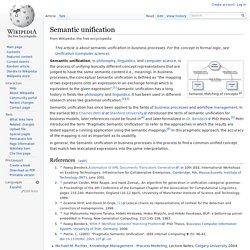
In business processes, the conceptual Semantic unification is defined as “the mapping of two expressions onto an expression in an exchange format which is equivalent to the given expression”.[1] Semantic unification has a long history in fields like philosophy and linguistics. It has been used in different research areas like grammar unification.[2][3] Semantic unification has since been applied to the fields of business processes and workflow management. In the earliest 90’s Charles Petri at Stanford University introduced the term of semantic unification for business models, later references could be found in[4] and later formalized in Dr.
Jump up ^ Fawsy Bendeck,Automation of XML Documents Translators Generation. Michael M. Quantum indeterminacy. Quantum indeterminacy is the apparent necessary incompleteness in the description of a physical system, that has become one of the characteristics of the standard description of quantum physics.
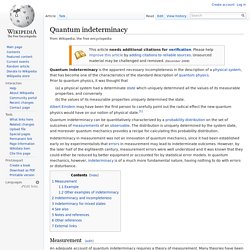
Prior to quantum physics, it was thought that (a) a physical system had a determinate state which uniquely determined all the values of its measurable properties, and conversely (b) the values of its measurable properties uniquely determined the state. Albert Einstein may have been the first person to carefully point out the radical effect the new quantum physics would have on our notion of physical state.[1] Quantum indeterminacy can be quantitatively characterized by a probability distribution on the set of outcomes of measurements of an observable.
Indeterminacy in measurement was not an innovation of quantum mechanics, since it had been established early on by experimentalists that errors in measurement may lead to indeterminate outcomes. Measurement[edit] Example[edit] The Pauli spin matrices A. Relativism. Forms of relativism[edit] Anthropological versus philosophical relativism[edit] Anthropological relativism refers to a methodological stance, in which the researcher suspends (or brackets) his or her own cultural biases while attempting to understand beliefs and behaviors in their local contexts.
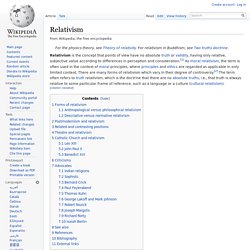
This has become known as methodological relativism, and concerns itself specifically with avoiding ethnocentrism or the application of one's own cultural standards to the assessment of other cultures.[3] This is also the basis of the so-called "emic" and "etic" distinction, in which: Open-mindedness. Open-mindedness is receptiveness to new ideas.
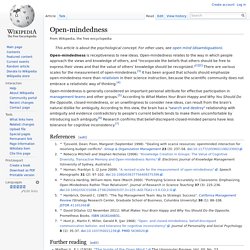
Open-mindedness relates to the way in which people approach the views and knowledge of others, and "incorporate the beliefs that others should be free to express their views and that the value of others’ knowledge should be recognized. "[1][2] There are various scales for the measurement of open-mindedness.[3] It has been argued that schools should emphasize open-mindedness more than relativism in their science instruction, because the scientific community does not embrace a relativistic way of thinking.[4] Open-mindedness is generally considered an important personal attribute for effective participation in management teams and other groups.[5] According to What Makes Your Brain Happy and Why You Should Do the Opposite, closed-mindedness, or an unwillingness to consider new ideas, can result from the brain's natural dislike for ambiguity.
References[edit] Jump up ^ Tjosvold, Dean; Poon, Margaret (September 1998). Consciousness. Representation of consciousness from the seventeenth century At one time consciousness was viewed with skepticism by many scientists, but in recent years it has become a significant topic of research in psychology, neuropsychology and neuroscience.
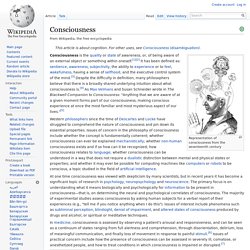
The primary focus is on understanding what it means biologically and psychologically for information to be present in consciousness—that is, on determining the neural and psychological correlates of consciousness. The majority of experimental studies assess consciousness by asking human subjects for a verbal report of their experiences (e.g., "tell me if you notice anything when I do this"). Issues of interest include phenomena such as subliminal perception, blindsight, denial of impairment, and altered states of consciousness produced by drugs and alcohol, or spiritual or meditative techniques.
Etymology and early history[edit] John Locke, British philosopher active in the 17th century. Awareness. Concept[edit] Awareness is a relative concept.
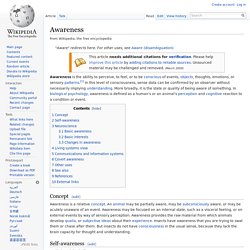
An animal may be partially aware, may be subconsciously aware, or may be acutely unaware of an event. Awareness may be focused on an internal state, such as a visceral feeling, or on external events by way of sensory perception. Awareness provides the raw material from which animals develop qualia, or subjective ideas about their experience.
Insects have awareness that you are trying to swat them or chase after them. Choiceless awareness. Choiceless awareness is posited in philosophy, psychology, and spirituality to be the state of unpremeditated, complete awareness of the present without preference, effort, or compulsion.
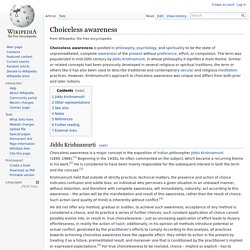
The term was popularized in mid-20th-century by Jiddu Krishnamurti, in whose philosophy it signifies a main theme. Similar or related concepts had been previously developed in several religious or spiritual traditions; the term or others like it has also been used to describe traditional and contemporary secular and religious meditation practices. However, Krishnamurti's approach to choiceless awareness was unique and differs from both prior and later notions. Awareness.